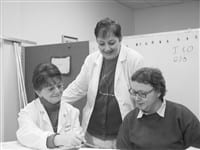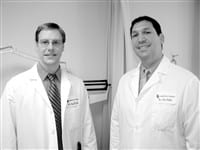Training Station Recently Opened School Aims To Help Workers Advance In Health Care Careers BY JOSEPH BEDNAR
The health care skills gap is widening — but one company is looking to close it.
As nursing homes and other long-term care facilities continue to deal with a shortage of staff, the need for home health aides (HHAs), certified nursing assistants (CNAs), and personal care homemakers is also growing, especially as the state’s population continues to gray, according to Barbara Lis, director of Capuano Career Center in Holyoke.
The center, not yet a year old, provides training for individuals who want to work in these health support positions, as well as for employees of institutions who need continuing education or additional training that the facility does not or cannot provide.
“There is an acute shortage of care staff across the state, and they wanted to take a very bold step and start a school,” Lis said of the center’s owners, Maria Capuano and Fannie Lin. “It’s very important … there are not enough places where people can go to get trained, so we’re trying to be as accommodating as possible.”
That means the school is flexible in its hours, its offerings, and its financing. Overall, Lis told The Healthcare News, the Capuano Career Center has met a real need in Holyoke and Greater Springfield — one that will continue to grow in the years to come.
Meeting a Need
Having operated Capuano Home Health Care in East Longmeadow, which for 20 years has provided services in skilled nursing; physical, speech, and occupational therapy; personal care assistance, and other areas, Capuano and Lin saw a need for training and expanded their reach through the new Holyoke facility in March.
Not only do prospective health care workers sign up for the courses — 60 hours for a personal care homemaker, 75 hours for a home health aide, and 100 hours for a CNA — to improve their career options, but many medical and care facilities also rely on the school to outsource their training needs.
“They’re trying to be as resourceful as they can, and we can be a benefit to the facilities that use us,” Lis said. “They come to us, and we carry the load of a training department for these facilities.”
The private, occupational school offers CNA and HHA training at contracted facilities as well as at its High Street headquarters near Holyoke City Hall. The center assists graduates in job placement after each course is complete, and inservice programs help current CNAs and HHAs satisfy their yearly 12-hour inservice education requirements. In all cases, getting the necessary training can be difficult, Lis said.
“A big challenge for everyone is a lack of funding,” she said. “A lot of educational programs have been cut in the state budget. There’s a lack of funding for displaced workers laid off from their jobs — there’s not enough money in displaced worker programs to accommodate all the needs.”
Through a mix of grant funding and payments from individual students and sponsoring facilities, Capuano Career Center has been doing all it can to get people into its programs, she added.
More Than Classwork
Once students are enrolled, Lis said, she wants to get them as much help as possible, and that goes beyond the classroom component.
“We’re starting to be more innovative with our programs and draw in more community resources,” she said, “so when students leave, they already feel connected to the community.”
The idea is to provide a full support program that boosts the training that enhances students’ careers. That’s where some of those community ties come in. For instance, Lis said, if a potential student has trouble speaking English, she can refer him or her to agencies that can help the student develop those basic skills.
The idea is to break down all barriers to a career in health care, both educational and cultural. And that emphasis is important, she added, because adults are more set in their ways and less pliable in their training than children or teenagers, so any hindrance to that training can become a major source of frustration.
The way the classes are structured is also a help, Lis said. They are small — no more than 25 students are enrolled in a class at any one time — so students get more individualized attention than in a larger program, and the hours are flexible, with both day and night courses available, so students can continue to earn a paycheck in their current jobs while working toward new opportunities.
The school’s location in downtown Holyoke, easily accessible by public transportation for students who don’t have vehicles, is another plus in attracting those who might not have considered changing careers at this point in their lives.
“I’m proud of the programs. We’re trying to give students a very comprehensive training program,” Lis said.
“We want people to be successful at this, so if we can identify issues that could be problems, we try to do whatever we can to make this a positive experience for them.”
Brighter Futures
With that training and the placement services offered, more and more students are gaining those positive experiences.
“Capuano gave us the skills to do something that we really love to do — help people that really need our help,” said Maria Borrero, a recent graduate.
And assisting people who want to turn their interests into careers benefits more than the patients being served, Capuano said. It allows people, particularly women who have devoted all their energies to raising families, to think about their own future and do something to improve it.
“We help them upgrade their careers, so they can never say, ‘I should have, but I missed the opportunity,’” she said. “This is a stepping stone for them. We want to help them be proud of their achievements.”
By drawing more workers into health care fields that face shortages of skilled staff — and by giving facilities a training option that doesn’t strain their budgets — Capuano Care Center is doing more than helping workers achieve their goals. It’s doing something to counter some of the trends that continue to threaten the health care industry in Massachusetts — and that is something to be proud of.



Comments are closed.